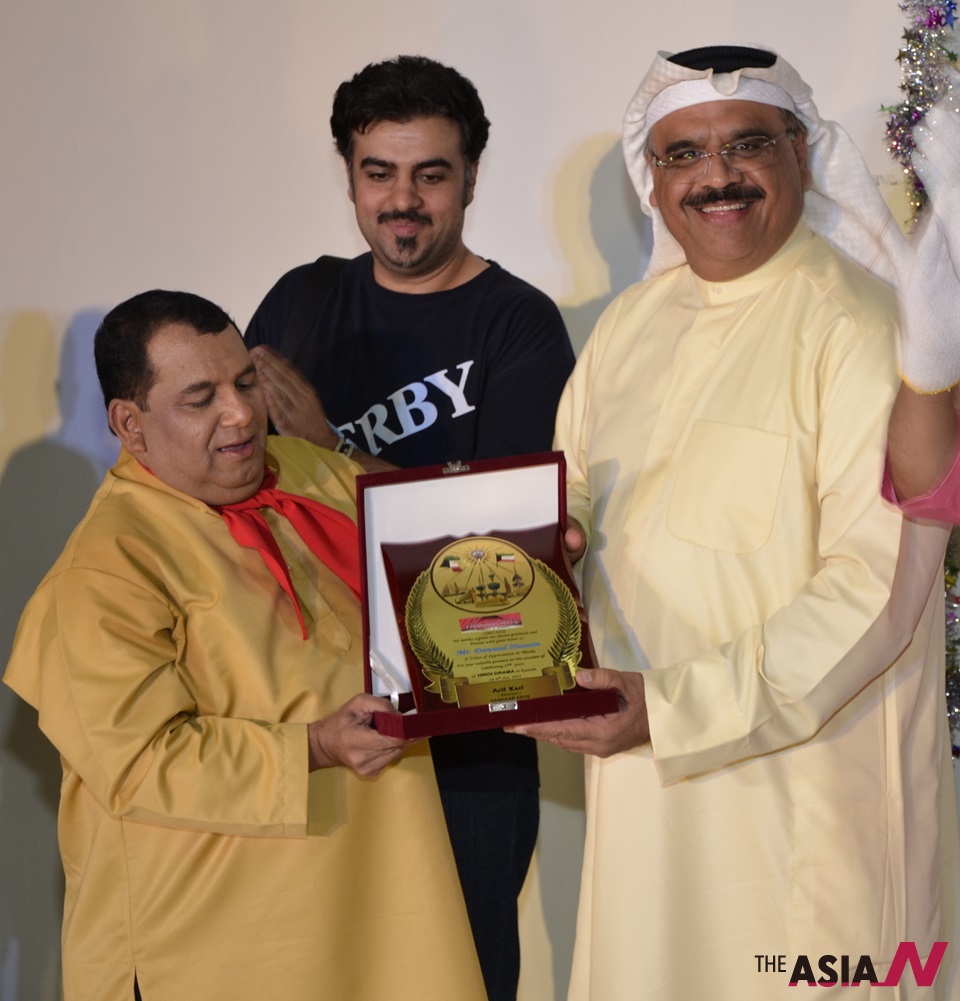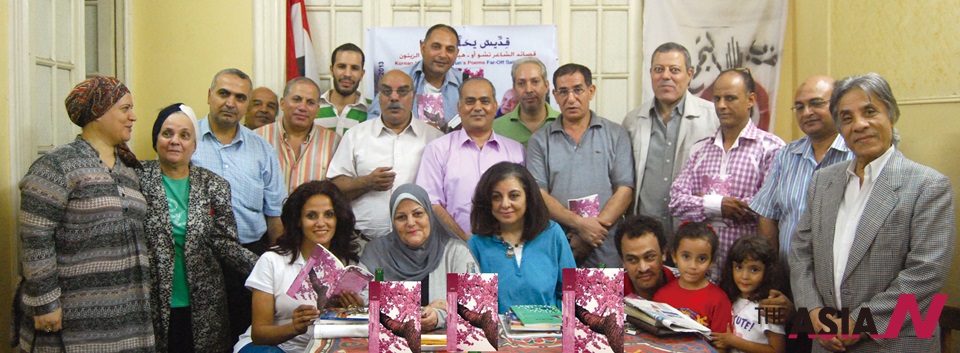
Ashraf Dali talks Korean trip on TV
Ashraf Aboul-Yazid(Dali), President of the Asia Journalist Association Middle East Chapter and Editor-in-Chief of The AsiaN, was interviewed live in two Egyptian TV programs on September 23.
During those programs, he talked about the activities in the recent visits to S. Korea and Tatarstan along with his new books published this year, the translation of the Korean poetry Far-off Saint, the translation of the folk Tatar tale written by Abdullah Tukay, The Goat and the Sheep, the book on creative women, and the cultural pictorial encyclopedia The Silk Road.
On the TV programs, he reviewed the Korean performance One Day, Maybe, referring to his recent visit to the Gwangju Memorial Cemetery for the 18 May democratic movement victims. He recalled the success story of Korea, quoted by his interview with Mr. Oh Joon, Korean Ambassador to the UN, on its transitions from a country gets loans to the state of a donor.
On mentioning the differences of poetry written by Korean poets, Ashraf Dali talked about his translation of Korean poet Cho O-Hyun and Ko Un: how their poems reflect the state of wisdom and the new visionary crafted lines of describing nature, and human relationship, and the director screened some photos related to the dialogue.
In addition, he spoke of Tatar poet Tukay(1886–1913) whose poetry was translated into Arabic by Ashraf Dali. He won two honoring plates from the Tartar Writers Union. He also mentioned the role of Zylia Valeeva, Minister of Culture in promoting Tatarstan outside Russia, and explained Tatarstan’s history and art. He talked about the Kazan International Festival of Muslim Cinema, from its beginnings to now.
The TV programs featuring the interviews with him were broadcast shown several times. The full episode can be seen on the official website of the Nile Life TV channel. Below is Ashraf Dali’s review on the Korean performance One Day, Maybe he watched in his recent visit to Gwanju, Korea.

A review on One Day, Maybe
by Ashraf Dali
It is early morning at the Gwangju Memorial Cemetery of May 18 victims. Rain drops were showering the huge green statues of the struggling wounded young women and men carrying signs and Korean flags. The silence of souls all around took me to close my eyes, and dream. When I opened them, I saw those statues coming alive, and moving forward one by one, leaving their places, calling me and all the audience around to follow them, while a loud voice of a woman in a military suit is commenting. Then, I discovered that I am no longer in the garden of the cemetery, rather I am in Gwangju Girls’ High School where a play inspired by those who participate in what we know nowadays as May 18 Gwangju Democratic Movement.
Every history book is regarding Gwangju as the birthplace of Korean democracy; the result of the democratic uprising that occurred in 1980. Against a military government which had originally appeared on the scene through a coup, the people of Gwangju had begun gathering in force to protest against martial law and demand freedom for the press. They dedicated their lives to democracy. The scenes of the movement and the military attacks on them, so far no one knows who orders soldiers to shoot the victims. And while the Gwangju Democratic Uprising didn’t directly bring democracy to South Korea, it fuelled further movements that eventually led to our modern-day democratic country. In 1993, President Kim Young-Sam made his position clear in a speech: The bloodshed of Gwangju in 1980 is the cornerstone of this Country’s democracy.
The floors of Gwangju Girls’ High School turned to be layers of history, or decades of time, or scenes of transitions from the military regime, and we were warned that we could pass moments of darkness, which actually were equivalent to the dark years of military coup that ruled the country.
At the first floor of time, we couldn’t imagine how huge the project is. This project started as a part of Project Development Institute hosted by the Asian Arts Theater of the Asian Culture Complex in Korea. Under the mission of developing Asian Arts, <One Day, Maybe> is produced by a group of international artists and experts from the Asian Culture Complex in Korea, the Art museum, Kochi, and the 21st century museum of contemporary art, in Kanazawa in Japan. Tristan Sharps from dreamthinkspeak, a British company recognized as a key producer of a site-responsive company, directed the performance.
Let me confess that when were banned to use our cameras I was astonished, and felt sorry, that it is a must for readers to see some scenes of the work we write about. But, when we were passing decades and floors, I should admit that for such a unique performance, it is a must to keep it unfolded, to give the new audience a fresh surprising look.
Rooms of investigations controlled by the police are full of youths whom are captured, questioned and tortured to confess some crimes that they did not commit. The invented way of showing those rooms separately could give you a sight that others did not watch. This one crafted invention by the director is excellent, and it is proving that if we could not see the whole picture, we were still able to discover the truth, even when the team of actors and actresses covered our eyes with black stripes, we were able to listen to those who suffer, and the sounds of the moving bodies, may be dead, taken out and in the rooms.
All those years passed, and Korea, like all open countries, were put under the umbrella of open markets, all brands were crossing borders to pave the Silk Road of globalization. And the great director sent us to an upper level, another floor, and new decades of shopping centers, coffee shops, video games stores, cafes (where real drinks are offered with real cakes!). As photos were not allowed I started to sketch the scene, asking myself if that would be the democratic scene the people of May 18 dreamt of? Is this democracy, where we all share the same behavior of seeking the same global products? Many questions and find no answers.
All the performance long, an old lady was moving her old handy trolley, from the very beginnings, along with some who are handicapped. You feel like that the lady is Korea herself, looking at those past three decades. We arrived at the last floor to feel some relax, where candles are lit opposite to the photos of May 18 victims. In all rooms there were ladies who offer us sweets and drinks, and even she asked us to sing. As the production, the audience was multinationals. The relief brought us to a level that we started to feel the heart pulses of those absent victims, but we came down to their places on the stage of the first floor, to be in the place of those who were in the first scene, and we turned to be those statues themselves, while the hundreds of seats, similar to us as audience, or similar to the number of victims, were holding candles sending more memories.
This production is a real example of what the Hub City of Asian Culture Project will offer us. This Asian Culture Complex, administered by the national government of Korea, aims to forge cultural ties and establish a forum of exchange with various Asian countries. I believe that with similar performances, activities, and ideas, that will keep Gwangju as the birthplace of Korean democracy, and make it the capital of Asian cultures, as well.






